ABOUT 'WIRELESS UTOPIAS 05'
CONTRIBUTE TO THE DISCUSSION BEFORE, DURING AND AFTER THE EVENT BY VISITING THE WIRELESS UTOPIAS 05 WIKI HERE.
PUT QUESTIONS TO THE PANEL VIA EMAIL IN ADVANCE OF THE EVENT <questions@cybersalon.org>.
![]()
BIOGRAPHIES
Provocateur:
John Wilson
www.johnwilsonweb.com
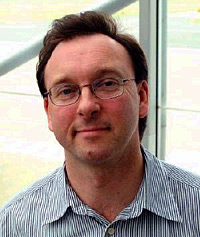
A founder and secretary of the Welsh community wireless network, Arwain.net. Co-founder of Access to Broadband Campaign (ABC), winner of the 2003 CNET Networks Outstanding Contribution to UK Technology Award. Chair of the Wales Broadband Stakeholder Group's Wireless SIG group. Co-founder of Open Spectrum UK.
Panel:
Gordon Adgey
Broadband4Devon
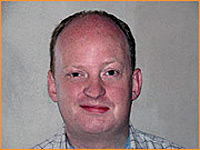
Gordon is currently working on the ‘Broadband4Devon’ project, a major EU backed programme to assist smaller businesses exploit the benefits of Broadband. He has spent the past three years building a Wireless Broadband project in Buckfastleigh, Devon. Prior to that, he has spent over seventeen years in the telecommunications industry, including working for over eight years in Cable and Wireless when Mercury Communications was in its rapid growth phase. During the late nineties, Gordon set up and advised a number of companies in the telecommunications, Internet and new media industries.
Peter Bury
Ofcom, Director of Strategic Resources
Peter is Ofcom’s Director of Strategic Resources, with responsibility for licensing radio frequencies for mobile communications, fixed wireless broadband, sound broadcasting and television.
Peter has worked in the field of communications technology since 1979 when he joined the team launching Prestel – the UK ’s first mass-market electronic information service. In his subsequent career with BT, Lotus Development Corporation and Mercury he was responsible for product development and management of innovative communications services like Telecom Gold, Lotus Notes and corporate telecoms outsourcing. In 1994 he set up and led the technology watch and corporate venturing arm of Cable and Wireless in Silicon Valley.
Peter became Head of R&D at the BBC in 1998, leading the technology team which launched BBC services on the digital TV platforms; developed new capabilities for production and transmission; and planned the BBC ’s use of radio spectrum. In 2004 he joined Ofcom.
Peter holds MA and PhD degrees from Cambridge and an MBA from Warwick University.
Peter Cochrane
www.cochrane.org.uk
www.conceptlabs.net
Peter's
new book, based on his columns for silicon.com, is now for sale:
Amazon UK
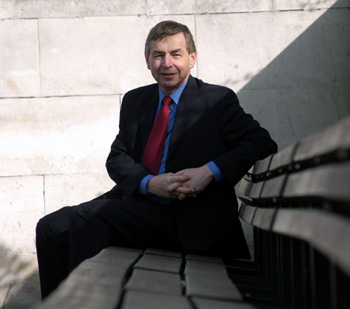
Peter Cochrane joined BT Laboratories in 1973 and has worked on a wide range of technologies and systems. In 1993 he was appointed as the Head of Research, and in 1999 he became BT's Chief Technologist. In November 2000 Peter retired from BT to join his own startup company - ConceptLabs - which he founded with a group out of Apple Computers in 1998 at Campbell CA, in Silicon Valley.
A graduate of Trent Polytechnic (now Nottingham Trent University) and Essex University. He has been a visiting professor to UCL, Essex, Southampton, and Kent. He was the Collier Chair for The Public Understanding of Science & Technology at The University of Bristol and is a Member of the New York Academy of Sciences. He has published and lectured widely on technology and the implications of IT.
He led a team that received the Queen's Award for Innovation & Export in 1990; the Martlesham Medal for contributions to fibre optic technology in 1994; the IEE Electronics Division Premium in 1986; Computing and control Premium in 1994 and the IERE Benefactors Prize in 1994; the James Clerk Maxwell Memorial Medal in 1995; IBTE Best Paper Prize and Honorary Doctorates from Essex, Robert Gordon, Stafford, and Nottingham Trent Universities and was awarded an OBE in 1999 for his contribution to international communications. Peter was awarded an IEEE Millennium Medal in 2000 and The City & Guilds Prince Philip Medal in 2001.
Dewayne Hendricks
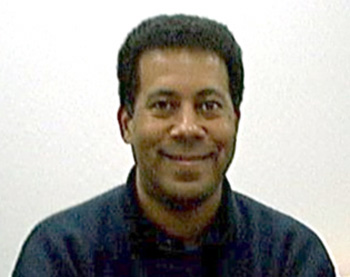
Dewayne Hendricks is currently CEO, of the Dandin Group, Inc., based in Fremont, California, USA. Dandin Group offers a comprehensive range of products and services, including research and product development, for wireless communications via the Internet. He also has been an active member of the Federal Communications Commission Technological Advisory Council (FCC/TAC) for the past seven years.
Prior to forming Dandin Group in 1999, he was the General Manager of the Wireless Business Unit for Com21, Inc. He joined Com21 following an opportunity to participate as the Co-Principal Investigator in the National Science Foundation’s Wireless Field Tests for Education project. The project sucessfully connected remote educational institutions to the Internet. The test sites ranged from rural primary schools in Colorado, USA to a University in Ulaan Bataar, Mongolia.
Dewayne was the CEO and co-founder of Tetherless Access Ltd, founded in 1990. Tetherless Access was one of the first companies to develop and deploy Part 15 unlicensed wireless metropolitan area data networks using the TCP/IP protocols. He has participated in the installation of these networks in other parts of the world including: Kenya, Tonga, Mexico, Canada and Mongolia.
Dewayne’s background includes several other entrepreunerial positions as CEO and founder, and inclusion on various “top 100” lists as an innovator in the industry. He has been involved with radio since receiving his amateur radio operator's license as a teen. More information on Dewayne is available at the Dandin Group web site: www.dandin.com. Information on the FCC TAC can be found on the FCC web site at: www.fcc.gov/oet/tac.
Michael Marcus
members.aol.com/marcusspectrum
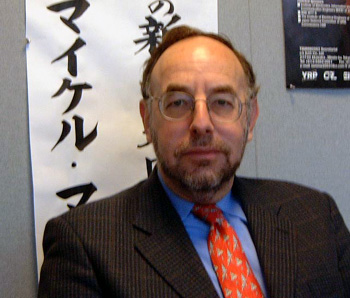
Michael J. Marcus is a native of Boston,
Massachusetts. He received S.B. and Sc.D. degrees in electrical engineering
from MIT while participating in a co-op program with Bell Labs. He served
in the US Air Force managing research projects relating to underground nuclear
test detection and then joined the Institute for Defense Analyses where
he studied electronic warfare issues. In 1979 he joined the Federal Communications
Commission where he held a variety of positions relating to technical policy
and radio monitoring.
He proposed and was responsible for the 1985 spread spectrum decision that established
the unlicensed bands for spread spectrum, setting the stage for both CDMA cellular
and Wi-Fi technologies.
He proposed and was responsible for an overall review of FCC technical standards
in 1983 that established a basic framework for when regulation was needed and
when it wasn’t.
During several years on the enforcement side of FCC, he pioneered the use of
DSP-based transmitter fingerprinting for FCC enforcement to identify illegal
transmitters. He lead the technical group that successfully identified the perpetrators
in two satellite jamming incidents (“Captain Midnight” and “Playboy”).
He later proposed and directed the effort to make millimeterwave spectrum available
for civil use. He played a key role in the FCC’s Spectrum Policy Task Force
during which he proposed many novel concepts such as “interruptible spectrum” which
are now being explore by FCC in more detail. Subsequently, he directed the preparation
of the FCC’s cognitive radio proposals
He has been a visiting associate professor at MIT in both EECS and the Sloan
School and has taught at George Washington University. He has been a visiting
at both Keio University and University of Tokyo in Japan. From 1997-99, he was
awarded a Mike Mansfield Fellowship and studied Japanese language for a year
before working at the Japanese Ministry of Posts and Telecommunications for a
year.
He retired from FCC in March 2004. He now lives in Paris, France where he consults
and works as a visiting researcher at École Nationale Superiéure
des Télécommunications. He is an IEEE Fellow.
Dr
Ono Purba
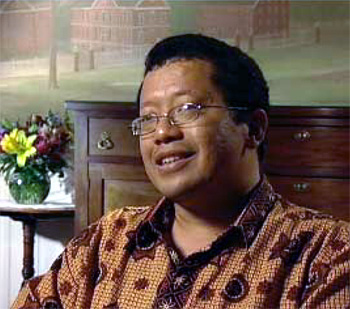
Indonesia's celebrated promoter of wireless networking; credited with inspiring the creation of RebelNet, which now links over 1500 schools, 2000 cybercafes and more than 2500 outdoor WiFi "hotspots."
“Dr. Onno Purbo is a self-confessed tech rebel.
He was educated in Canada but returned to Jakarta to set up a technology
movement whose innovative technologies prey on the margins of legality.
His open-source philosophy is designed to equip Indonesian kids with
the skills to participate in the knowledge economy. Thanks to this country's
International Development Research Centre, where Dr. Purbo is taking
a sabbatical, Canada has a direct link to four million Indonesians.”
Ken Wiwa, Globe and Mail
Dr. Onno Purbo's one-year sabbatical with IDRC has included dissemination and training at conferences and workshops in Laos, Geneva, Boston, Malaysia, Jakarta, Canada, India, Bangladesh, and South Africa. His interaction with ICT regulators, activists, policy makers, academics, and "techies" from countries around the globe has brought them insights, knowledge and hands-on experience about low-cost community infrastructure solutions such as WiFi (Wireless Fidelity) and VoIP (Voice over Internet Protocol).
More information on Dr. Onno Purbo can be found in this downloadable PDF.
William Webb
Ofcom, Head of Research and Development and Senior
Technologist
William joined Ofcom as Head of Research and Development and Senior Technologist in 2003. Here he manages a team of 35 engineers providing technical advice and managing research across all areas of Ofcom's regulatory remit. He also leads some of the major reviews conducted by Ofcom. Previously, William worked for a range of communications consultancies in the UK in the fields of hardware design, computer simulation, propagation modelling, spectrum management and strategy development. William also spent three years providing strategic management across Motorola's entire communications portfolio, based in Chicago,
William has published seven books, sixty papers, and four patents. He is a Visiting Professor at Surrey University. He is a Fellow of the IEE where he sits on the Publications Board, chairs the Advisory Committee for the Communications Magazine and is a Series Editor for the IEE Telecommunications Books. His biography is included in multiple "Who's Who" publications around the world. He sits on the judging panels of the Wall Street Journal "European Innovation Awards" and the GSM Association annual awards.
William has a first class honours degree in electronics, a PhD and an MBA.
![]()
ABOUT OPEN SPECTRUM UK
Open Spectrum UK was convened in January 2005 in order to make a submission to the Ofcom Spectrum Framework Review. This submission was signed by 10 UK non-profit organisations, engaged in community wireless networking and communications policy issues.
Open Spectrum UK has worked in collaboration with Open Spectrum International, an advocacy project supported by the Open Society Foundation. Open Spectrum UK acknowledges the support of the Open Society Foundation for the Wireless Utopias 05: An Open Future for Spectrum? event at the Science Museum's Dana Centre. Open Spectrum UK is convened by John Wilson (co-founder Arwain.net) and Julian Priest (co-founder Consume.net).
Open Spectrum UK plans a programme of activities to engage informed debate upon the future of spectrum access and communications rights in the UK.
Charles Bass
After a career as an avionics engineer in the Navy, Charlie worked for AT&T based in Holland (including development of the Wavelan wireless card). Charlie currently operates The ITC UK Ltd, an independent consultancy with particular reference to ICT support for rural SME's across Wales. Charlie is Chair of the Wales Broadband Stakeholder Group.
Robert Horvitz
www.openspectrum.info (formerly www.open-spectrum-international.org)
Convenor of Open Spectrum Foundation (formerly Open Spectrum International). Robert helped publicize the development of "packet radio" as co-host of Compuserve's HamNet Forum in the early 1980s. (Packet radio evolved into the many flavors of wireless Internet.) He wrote extensively about "spectrum politics" and reported on that subject for Radio Netherlands, eventually becoming the head of the Association of North American Radio Clubs. He moved to Europe and became the Soros Foundations' regional radio consultant in 1992. Until recently, he was on the management team of the Global Internet Policy Initiative.
Julian Priest
informal.org.uk
Co-founder of consume.net, the UK's first wireless network community. Julian has worked within the Informal.org research framework on social aspects of wireless technology for the developed and developing world, including the development of the "pico-peering agreement". Co-founder of Open Spectrum UK.
Kevin Werback
werbach.com
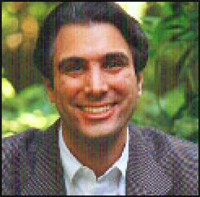
Kevin Werbach is a leading expert on the business, policy, and social implications of emerging Internet and communications technologies.
Werbach is an Assistant Professor of Legal Studies at The Wharton School, University of Pennsylvania. He is the founder of the Supernova Group, a technology analysis and consulting firm. He advises companies and writes about emerging trends in communications and information technology. He also organizes Supernova, a leading executive technology conference.
Werbach is the former editor of Release 1.0, a renowned industry publication that provides leading-edge analysis of key technology trends for senior executives. Working with technology industry guru Esther Dyson, he also co-organized the annual PC Forum conference. Previously, he served as Counsel for New Technology Policy at the Federal Communications Commission. Called “one of the few policy wonks who really got it” by Wired, he helped develop the United States Government’s e-commerce policy, shaped the FCC's approach to Internet issues, and authored Digital Tornado, the first comprehensive analysis of the implications of the Internet on telecommunications.
A sought-after speaker and commentator, Werbach appears frequently in print and broadcast media including CNN, CNBC, NPR, ABC News, USA Today, The New York Times, The Wall Street Journal and The Washington Post. His writing has appeared in Harvard Business Review, Fortune, Wired, IEEE Spectrum, The Industry Standard, Harvard Law Review, Slate, and Business 2.0, among other publications. He is a fellow of the Global Institute for Communications in Japan, and serves on the advisory boards of Nokia Innovent, Socialext, and the Genesys Angelbridge Fund.
Werbach is a magna cum laude graduate of Harvard Law School, where he served as Publishing Editor of the law review, and a summa cum laude graduate of the University of California at Berkeley. He lives with his family in the Philadelphia area.
Think Pieces – Triggers for Discussion
John Wilson - Towards an Open Spectrum Policy?
Open Spectrum UK seeks to engage the public interest agenda for the exploitation of the strategic national resource of the radio spectrum.
We consider the following three bearing points as a starting point for our debate Wireless Utopias 05: An Open Future for Spectrum?
1. The Invisible Wealth of Nations
The reform of Spectrum Management Policy is one of the strategic issues for the Communications Agenda in the UK at present! Yet spectrum policy is below most people's radar - no pun intended; an arcane area of government policy that is shrouded in a legacy of opaqueness.
We may say that the radio spectrum is rather a part of The Invisible Wealth of Nations. We need to engage wider public debate on the future of this strategic national resource. For the definition and institutionalization of the rights of access to the radio spectrum is one of the keys to our future communications ecology.
2. Spectrum reform- from resource to commodity?
We are currently engaged in a period of global reform and transition in Spectrum Management Policy. In country after country, the regulatory state is playing catch-up with the revolution in digital (radio) technologies and is examining new ways of allocating rights of access and use for the radio spectrum.
There was a time a generation ago when the radio spectrum was dubbed "the invisible resource" (Levin). The radio spectrum was characterised as a common public good and a global resource. A strategic resource to be managed in the public interest.
Since the latter half of the 1990's the market model has been in the ascendancy, with the implementation of auctions (by the FCC) as a means of allocating spectrum access.
In its current Spectrum Framework Review, the UK regulator Ofcom proposes a bold new market approach to spectrum Management Policy (with a focus upon liberalization, market mechanisms - auctions, and spectrum trading). This is a policy departure that is consistent with the UK's role as pacesetter of telecoms liberalization (with the privatization of BT in 1984).
Over the coming months Ofcom is due to issue its response to the submissions to the Spectrum Framework Review (and the related Spectrum Framework Review Implementation Plan).
International experts on spectrum reform view the UK as an exceptional case in the extent to which Ofcom propose using an economic policy tool for spectrum management.
Wireless has been to the fore of the digital revolution. Recent years have seen a dramatic phase of innovation in wireless communications, from the assumption of mobile cellular as an everyday communications medium to the deployment of 802.11 radio technologies - from the license-exempt Wi-Fi explosion to the current Wi-Max hype. A recent OECD report acknowledged UK and European community wireless networks (license-exempt 802.11 wireless) as innovators in broadband access. Wireless remains on the UK Nations and Regions agenda, as a strategic "community first mile" broadband solution.
We need to engage a sense of urgency about the future of wireless communications, as we move towards a new strategic framework for radio spectrum management in the UK.
On a cautionary note, we have the - unmentionable- fiasco of the 3G auctions in the year 2000 as an empirical case of the unintended consequences and adverse epochal impact of economic tools (auctions/game theory) in Spectrum Management Policy.
Above all we need to enable an open future of ubiquitous communications, bandwidth abundance and innovation; not limit ourselves to artificial scarcity, legacy interests, and the foreclosure of future options.
In this shift from spectrum-as-resource to spectrum-as-commodity, focussed debate upon the public interest has been for the greater part conspicuous by its absence.
3. Towards an Open Spectrum policy?
"I (previously) argued against the pure property rights system
for the radio-magnetic frequencies that is advocated by some reformers,
and also against the free-access "commons" approach advanced
by others (…). The areas of commonality, however, permit a synthesis.
No, they require it. This is not the subject of idle academic speculation,
but one of collective head-scratching on both sides of the Atlantic and
Pacific. All of us agree that an overhaul of the present system of allocating
spectrum is a key task for the new economy. But what should take its
place?".
Eli M. Noam: The Fourth Way for Spectrum, Financial
Times, 29 May 2003
There is a growing consensus amongst spectrum policy experts upon the need to move beyond legacy property-based approaches to the management of the radio spectrum.
The "open market" and "open spectrum" (mistakenly conflated with "spectrum commons") have emerged as two strong poles of the current debate. Policy-makers are focussed upon a definition of the fundamental rights of access to the radio spectrum and an apportionment of licensed and licence-exempt means of access.
The FCC's Spectrum Policy Task Force Report is a landmark piece of policy revision towards a new paradigm in Spectrum Management Policy.
Eli Noam hits the nail on the head - we need a synthesis to move forward with. We need to move beyond the current rhetoric of "the market" and "the commons" to practical arrangements that reconcile the full range of stakeholder interests. Shall we reduce the spectrum agenda to a zero sum game, or are multiple strategies and winners possible? Beyond the rhetoric and the theology, is it possible to balance the technological, economic and public interest imperatives?
"Open Spectrum" is the discourse of an emerging international public advocacy movement for spectrum reform, inspired by a vision of public access and technology innovation.
Open Spectrum UK argues for a balance of the commercial and the public interest in access to and use of the radio spectrum.
The model for regulatory best practice in spectrum policy has yet to be developed! The Open Spectrum UK position advocates a mixed approach to Spectrum Management Policy, to embrace the full range of policy tools (technology, economic and public policy) and to seek to balance the commercial and the public interest.
"Serving citizen-consumers in the digital age" is the mission statement that appeared on its website at the launch of the UK's new converged communications regulator Ofcom. And this should indeed provide our cardinal bearing point for the exploitation of the strategic national resource of the radio spectrum, "The Invisible Wealth of Nations". It is also a sobering thought to know that number one on the list of the six areas of statutory duty for Ofcom - duly enshrined in a commemorative stone at Riverside House - is "Ensuring the optimal use of the electro-magnetic spectrum"
We close with consideration of the words of Michael Powell, the Chair
of the US government's Federal Communications Commission, prior to the
launch of the FCC's Spectrum Policy Task Force. Striking a note of both
urgency and optimism, Powell's bold vision enjoins the need for a new
paradigm in Spectrum Policy appropriate to the new digital wireless technologies
and emerging markets and serving the benefit of all consumers - and once
again a mixed approach to Spectrum Policy is the order of the day:
Consumers Deserve a New Spectrum Policy Paradigm: All consumers (…) deserve a new spectrum policy paradigm that is rooted in modern-day technologies and markets. We are living in a world where demand for spectrum is driven by an explosion of wireless technology and the ever-increasing popularity of wireless services. Nevertheless, we are still living under a spectrum “management” regime that is 90 years old. It needs a hard look, and in my opinion, a new direction. (…) Modern technology has fundamentally changed the nature and extent of spectrum use. So the real question is, how do we fundamentally alter our spectrum policy to adapt to this reality? The good news is that while the proliferation of technology strains the old paradigm, it is also technology that will ultimately free spectrum from its former shackles.
We are truly at a crossroads in the spectrum policy component of the digital migration. We must make critical decisions that balance the interests of existing spectrum users and potential new entrants to ensure that there is every opportunity and incentive to put spectrum to its highest and best use for the benefit of all consumers. It is important to remember that at the end of the day, we're not necessarily looking for one “right” path to our destination. There is no one-size-fits-all model for spectrum policy. We may well find that there are multiple approaches to the spectrum policy peak that should be pursued in different contexts in different spectrum bands over short, medium and long-term horizons.
Additional information on:
John Wilson's Blog: Prism
Exploring technology, society and culture
<http://prismspectrum.blogspot.com/2005/07/looking-to-spectrum-for-networking.html>
![]()
Thoughts on Basic Issues of Spectrum Policy
Michael J. Marcus, Sc.D.,
FIEEE
members.aol.com/marcusspectrum
May 24, 2005
The basic framework for spectrum policy was developed in the early 20th century under conditions that were very different than today. Indeed, the sinking of the Titanic had a major impact on early policy development. In those days frequency were very limited and the 3-30 MHz band was called “high frequency” because it appeared to be an almost insurmountable limit. Demand for radio communications was expected to be long range and hence exclusive licenses were needed over large areas. There were few options for modulation and other technical parameters so government selection of choices seemed reasonable. It was not expected that enough spectrum would be available for anyone who wanted it so government selection of “haves” and “have nots” seemed reasonable.
Traditional spectrum management is the closest analogy to Soviet-style central planning that exists today outside of Belarus. Traditional spectrum management involves government intervention to balance supply and demand, forecasting when new technologies will become available, and predicting demand for new services. A veteran of the Soviet Union’s GOSPLAN (State General Planning Agency) would feel right at home!
The European spectrum managers and ETSI developed HIPERLAN as a short range link for Europe in the early 1990s and attempted to mandate it as the only option. However, a very different regulatory scheme in the US created 3 unlicensed bands in 1985 with almost no government interventions on the details of their use. The private sector, in this case IEEE 802.11, took this broad spectrum policy and developed specific products that were not mandated by any government regulation. Which is more common today, HIPERLAN or Wi-Fi?
Why is Qualcomm, the developer of the CDMA cellular technology which is at the core of all 3G systems, an American company, not Japanese or European? Japan and Europe depended on consensus development of technical standards for both 1st and 2nd generation cellular systems. The US used this approach for 1st generation also, resulting in the AMPS/TACS system. However, the convergence of the 1981-85 FCC rulemaking to explore civil applications of spread spectrum/CDMA and the 1987 FCC decision to stay neutral on 2nd generation technology allowed Qualcomm to raise the capital to develop CDMA, develop it, and find willing customers. Basically CDMA was too radical an idea in the 1980s to have ever resulted from a European or Japanese style consensus standards development.
In the early days of radio most demand was perceived to be for long distance. Today there is a rapidly growing demand for short distance communications. Cellular cell sizes are rapidly shrinking and approaching 10s of meters. Many home users have Wi-Fi systems with ranges of a few meters. In several countries cell phone numbers already exceed the population so clearly people are using multiple radio devices and there will be a need for interdevice communication.
While 30 MHz once seemed that it was a “high frequency”, the upper limit for commercial electronics is 77 GHz – used for automotive radars. In the US, FCC now has service rules going up to 95 GHz. These “millimeter wave”/mmW frequencies are very different than the frequencies in use in the formative days of spectrum policy. They have much more limited range due to path losses. They require almost line-of-sight paths since they do not “bend”/diffract like lower frequencies. And their small wavelength, in the mm range, result in small antennas having a near searchlight-like tight beam. Frequencies near 60 GHz are actually absorbed by atmospheric oxygen limiting the range even more. Do these frequencies need radio licenses? Ofcom’s predecessor in the late 1980’s suggested that they did not. FCC saw the wisdom of this thinking and created an unlicensed band in 57-64 GHz. Oddly Ofcom is now thinking of licensing the same band.
Classic spectrum management inevitably results in lots of “white space” – spectrum that is properly allocated and licensed but is unused at a given location and time. Even in crowded metropolitan areas there can be quite a large amount of white space. Why? Many users are able to demand spectrum from the regulator independent of marketplace forces and have little marginal cost on holding on to lightly used spectrum. Other users have highly time variable demands and demand spectrum sized to their peak needs even if this results in low average utilization. Traditional radio technology also gave few options to use here. But cognitive radio technology and secondary market policies are two new options to get rid of the white space and increase effective spectrum utilization.
Cognitive radio technology searchs for available spectrum, either passively or in cooperation with licensees, and then allows it to be used on a noninterfering basis with the original licensee. It could be used for unlicensed services or licensed services. The present FCC rulemaking on unlicensed use of the TV spectrum is actively exploring the options here and they are very controversial.
Secondary market policies, already permitted in the US for many classes of radio licensees, permit licensees to make private arrangements with others to “lease” their spectrum. While some view this as “unjust enrichment” for inefficient spectrum users, in the real world it is difficult for government regulators to take spectrum away from the “haves” without compensation and give it the “have nots” and at least the spectrum ends up being more heavily used and the increased availability drives down prices. Other regulators are moving slower than the US in this area.
The growing success of Wi-Fi systems in the US and other countries has resulted in a reexamination of the role of unlicensed systems. The previous assumption that unlicensed systems would not attract investment was clearly over simplified. Unlicensed is not longer the step child of the spectrum management community although a controversy continues as too how large a role it should play in the future.
![]()
Dewayne Hendricks: Looking to Spectrum for a Networking
Utopia
<http://muniwireless.com/technology/766>
![]()
Julian Priest - The State of Wireless London
This study looks at how wireless networking (WLAN) in London has developed over the last three years from hacktivist pastime to mainstream pursuit. Comparing networks built by freenetwork groups, commercial hotspot providers, and public sector initiatives the study also examines the sales and uptake of WLAN equipment and makes some direct measurements of wireless activity in the Greater London area. Finally the study looks at the development of WLAN in the home and makes a recommendation for a Wireless Festival for London in 2004/2005.
informal.org.uk/people/julian/publications/the_state_of_wireless_london/
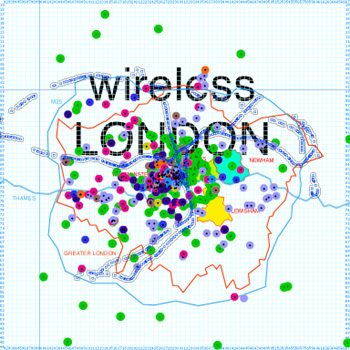
![]()
Peter
Cochrane's Blog: Commentary & Analysis
Don't hold your breath for 3G
Will the mobile industry ever learn? Customers call the shots, not
industry or government...
Thursday 2 June 2005
<http://comment.silicon.com/0,39024711,39130911,00.htm>
The Science Museum, London, UK
I just had a meeting with a group of young people who brought back a flood of memories from the 60s, 70s, 80s and 90s, when the UK population wanted commercial radio but the government of the day was wed to a BBC-only world. This resulted in offshore radio stations on trawlers 'illegally' transmitting commercial radio. The government and regulators were outraged, whilst the public and advertisers were delighted. The outcome? Commercial radio was legalised. Public action and opinion won the day!
Next the UK population wanted Citizen Band radio but the government and regulators of the day were wed to strict control. So the public started shipping in and using 'illegal' equipment from the US. The outcome? A de facto Citizen Band was established that ultimately had to be legalised. Again public action and opinion won the day!
During the same era the UK government demanded that all car radios be licensed. But the public refused and in a legal battle reminiscent of today's RIAA MP3 file-sharing wars, people were prosecuted for non-payment. The outcome? So many people refused to pay that the system collapsed and the government had to relent - and make all car and portable radios exempt. The power of public action won again!
Today that history looks all so quaint and the battles so unnecessary, just like the censorship of the works of DH Lawrence et al. Relaxing the controlling regimes has instead seen a flourishing of creativity and technology that no one predicted 50 or even 20 years ago. And yet we still have industries and governments trying to dictate, trying to control and trying to limit what we can and cannot do. A long time ago I decided that all such attempts were futile and my approach to technology has been to give it to the users and stand back to just observe what they do. It is the only satisfactory model I have found for getting business models right.
As my friend Alan Kay (he's ex-Apple) often remarks: "The best way to predict the future is to build it."
It was on this premise that I approached the prospect of 3G mobile systems through the mid to late 90s, right up to the UK licensing and rollout fiasco of the year 2000 and beyond. Despite the protestations of many including myself, the industry was raped of billions of pounds by government, over 250,000 jobs were lost, the technology was more than three years late, operators didn't share base station sites, there were no significant service offerings beyond those that had already failed during the WAP fiasco and costs were wholly uneconomic for individuals and companies.
As it turned out, the much celebrated '2Mbps to your handset' never happened and customers don't surf the web, send photographs or engage in videoconferencing via mobiles. In short, industry over-promised and under-delivered. If only government, regulators and industry had concentrated on the customers how different it might have been!
So here I am with a group of youngsters with their Swiss Army Knife mobile phones - i.e. they do absolutely everything imaginable but badly.
What do they do with them? In order of popularity it seems to go like this: text, talk, ring tones, pics, music and movies. I can hear the mobile executives salivating from here! Surely we can make lots of money out of ring tones, pics, music and movies - can't we? Sorry but no! Text is cheap and the primary user mode. Voice is used but only if you really have to. And the rest are mainly done offline using a USB cord or Bluetooth.
Then of course there is BlueJacking - sending messages and pics to people across a room at random or by design, mobile-to-mobile. Fun, eh? Lots of megabits being moved around but not over the mobile network.
My prediction: 3G will continue to limp along with the lukewarm support of an indifferent customer base and an industry trying to recover its sunk network and licence costs for a decade or more.
As for watching TV and movies over the mobile network, will people do it and will the industry make money? I might be wrong but my advice to the industry is: don't hold your breath! Pocket-sized full-colour TV sets have been available for years at less than $100 and don't sell in large numbers. On second thought, praying might be a safer bet than holding your breath.
Contrast all of this with the DIY world of Wi-Fi and VoIP, where the customers established the need and have largely funded the rollout. Interestingly this prospect was identified and proven probably as early as 1996 but the mobile and fixed operators had their sights firmly fixed on extracting an extra $1000 a year from every household in the land with a raft of new technologies and a questionable list of improbable services. Just where was the money supposed to come from?
Well, watch out for 4G, 5G, 6G etc... it is time to watch the users and the technology again!
Peter Cochrane's Blog: Mobile & Wireless
Wireless
access - the US v Europe
Lessons from across the pond...
Monday 13 June 2005
<http://networks.silicon.com/mobile/0,39024665,39131139,00.htm>
What a lot of interesting replies and reactions to my recent post on the IT 'SS'. I'd say half get it and the other half need to book a flight to the US to give it a try.
While they are there they should take a look at the road system and the airports too. We have a choice, we really do - to build an inclusive or exclusive society. The EU is about exclusion, stopping people doing things by price, poor facilities or control freak mentalities. The US is about inclusion, making things available so that people may participate and succeed.
Unless you have been here and tried it you probably won't get it - and hey, you don't have to. If you don't know what you are missing, what's the problem?
Ask yourself the question: why is the productivity per capita in the US two times that of the EU? Might it be to do with infrastructure - road, rail, air transport and communication networks and connectivity? I reckon the UK is losing around 20 per cent per annum because people cannot get where they want to go or communicate. But perhaps this is a topic for another blog...
The cost of providing Wi-Fi access is less than $1 per day so why charge and why try to protect it? The really smart folks can break in at will, and if they were really intent on doing serious harm they would have done so by now.
It doesn't take a lot of imagination to really secure the important stuff. But I suppose it will be like everything else in the EU - we will have to wait for the control freaks to die before we see them replaced by those who really get IT.
And at risk of belabouring the point... I have just been joined by two American refugees from a local Washington DC hotel who are totally outraged at being asked for $9.00 to connect to the internet at 6Mbps from their room. And I can understand it! The towels, soap and shampoo cost $6.50 and they don't charge for them, so why include internet access on the bill when it cost less than $1?